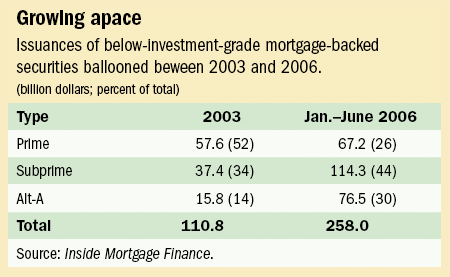Dad2three
Gold Member
- Thread starter
- #81
, like Canada, that relied on GOOD GOV'T REGULATORS missed the Bankster created bubble!
this is a perfect example of the ignorance on which liberalism is based. All you need is good govt regulators they think. Its as if they think Obama set out to put bad regulators at the VA or East Germany China and Cuba set out to impoverish their citizens with bad regulators.
The fact is capitalism makes everyone a regulator and so yields the best results which is why China just switched to it and achieved such phenomenal results. If you still don't understand please ask specific questions.
Isn't Rush on to get some more of your financial advise from him?
So the US doesn't practice capitalism? lol
GROW A BRAIN BUBBA
Q Why would Bushs regulators let banks lower their lending standards?
A. Federal regulators at the Office of the Comptroller of the Currency (OCC) and the Office of Thrift Supervision work for Bush and he was pushing his Ownership Society programs that was a major and successful part of his re election campaign in 2004. And Bushs regulators not only let banks do this, they attacked state regulators trying to do their jobs. Bushs documented policies and statements in timeframe leading up to the start of the Bush Mortgage Bubble include (but not limited to)
Wanting 5.5 million more minority homeowners
Tells congress there is nothing wrong with GSEs
Pledging to use federal policy to increase home ownership
Routinely taking credit for the housing market
Forcing GSEs to buy more low income home loans by raising their Housing Goals
Lowering Invesntment banks capital requirements, Net Capital rule
Reversing the Clinton rule that restricted GSEs purchases of subprime loans
Lowering down payment requirements to 0%
Forcing GSEs to spend an additional $440 billion in the secondary markets
Giving away 40,000 free down payments
PREEMPTING ALL STATE LAWS AGAINST PREDATORY LENDING
But the biggest policy was regulators not enforcing lending standards.

